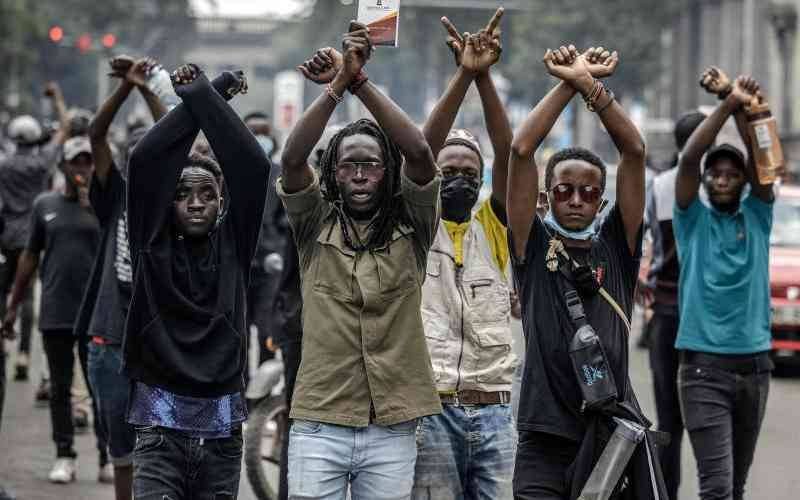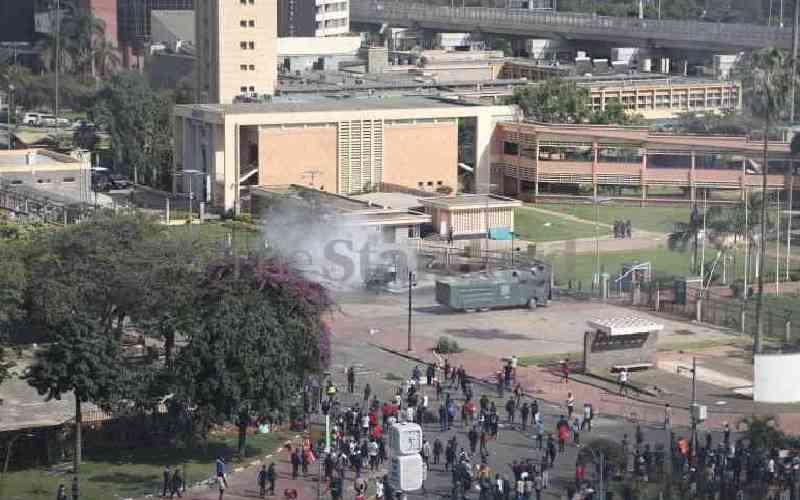Faith Odhiambo LSK President during The NOC-K East Africa Gender Conference in Nairobi on Jan 29, 2025. [Jonah Onyango, Standard]
In March 2024, Faith Odhiambo, 38, made history when she became the 51st President of the Law Society of Kenya (LSK), and the second woman to be elected President after former Cabinet Secretary Raychelle Omamo. Since then, she has been the most visible and vocal woman, fighting injustices and defending rights crusaders.
During the June 25, 2025 Gen Z protests, she is among those who boldly stood in the gap for the youth. She remained the voice for the voiceless and the reason to reaffirm oath and the commitment of Advocates to defend the independence of the Judiciary, compliance with court orders.
In an interview with the Spice FM, Ms Odhiambo said the Gen Z uprising reminded everyone that eternal vigilance is not poetic wallpaper; it is a civic muscle that atrophies when unused.
“Gen Z forced courts to speak faster, parliamentarians to apologise something we had never witnessed and the President to retract positions. They re-energised a Constitution that had started to feel ornamental,” she said.
Take us back to the first day you stepped into that role as “street lawyer in chief”. What happened at Central Police Station?
That was June 18, 2024. Tear-gas drifted over the gates. We insisted no advocate would leave until every detainee was booked in the Occurrence Book or released. Hours later, senior officers gave the word: everyone goes home. I realised that if we had not stood there, some of those kids would simply have vanished.

The public saw you, cape billowing in the tear-gas, but few know about the machinery behind you. How did you turn individual outrage into a nationwide legal response?
Two things: delegation and solidarity. I convened an emergency Zoom meeting at 11pm with 35 young counsel across the counties and told them, “Each of you is Faith tomorrow”. We created a colour-coded spreadsheet of police stations, set up a signal group that pings when anyone is arrested, wrote a one-page bail-application template, and agreed that whoever filed first would dump the precedent in the group for instant reuse.
Branch chairs pledged vans, stationery, cash. Big corporate firms formed silent drafting cells petitions at two in the morning, sworn affidavits couriered by boda-boda to whichever court opened first. Civil-society partners supplied medics and psychologists; journalists mapped safe corridors out of danger zones. The tapestry was miraculous, woven overnight by people who had never shared a room, only a purpose.
Leadership textbooks rarely discuss fear. Were you afraid?
Every time my phone rings after midnight I brace for a voice saying, “We have your colleague”. But fear is not an exit clause. Leadership is fidelity to duty in spite of tremors in the knees.
You also faced institutional pushback court orders ignored by police commanders, threats against judges. What convinced you the legal route could still bite?Two landmark decisions. First, Justice Odunga’s order that held former DCI boss George Kinoti personally liable for contempt. Second, Justice Mwita’s ruling against Acting IG Masengele for defying bail directives. Those orders hang like portraits in every police corridor. Even when ignored, they stain careers; HR (human resource) files never forget.
Let’s talk command responsibility. You’ve sued not just arresting officers but their superiors, even the Inspector-General. Why is that principle so important?
Because impunity is a ladder. Remove the top rungs, and the lower ones dangle in mid-air. When a regional commander realises he might personally finance damages from his pension, the calculus changes overnight.
Critics say you’ve politicised the Law Society of Kenya. What is your response?
The Constitution is not partisan. If defending Article 37 the right to assemble casts me as political, then the drafters of 2010 were the original politicians. Our mandate is to protect the rule of law, not court favour.
International observers are watching Kenya for possible crimes against humanity. Under what circumstances would you endorse taking evidence to The Hague?
The threshold is high - widespread or systematic attacks against civilians, State complicity, exhausted domestic remedies. If KNCHR (Kenya National Commission on Human Rights) and independent pathologists can corroborate patterns of lethal force or enforced disappearances across counties, then we would have a dossier worth the ICC’s time. But first we must protect the local bodies that collect that evidence as they are being starved of funds and vilified as rumour peddlers.
You’ve mentioned the financial squeeze on oversight agencies. What can ordinary citizens do besides tweeting outrage?
Petition their MPs during budget hearings, demand line-item answers. Parliament rubber-stamped the illegal clauses in the cyber-crime law nine months after the High Court struck them out. Public pressure can reverse that. MPs are suddenly humble when constituents record them live and ask why National Cohesion and Integration Commission’s investigative budget is lower than their travel votes.
Let’s pivot to gender. Kenya has never had a female Chief Justice and a female LSK president at the same time until now. Does that symbolism matter on the street?
Symbolism opens doors but competence keeps them open. When a girl in Kibra sees Martha Koome and Faith Odhiambo occupying podiums traditionally reserved for men in dark suits, she recalibrates her horizon. That is not soft power; it is scaffolding for ambition.

A year later, what has surprised you most about Gen Z?
Their humour under fire. They turn court rulings into TikTok skits, quoting Latin maxims between dance moves. Satire is a survival tool; it diffuses fear but also archives memory.
And what disappoints you?
Short attention spans. After a victory they drift to new hashtags. Eternal vigilance is, well, eternal.
You’re writing a book, or so social media claims. True?
At the moment the “book” is a Google Drive folder labelled “Someday”. But I meticulously keep diaries, dates, names, and places. When the dust settles, I’ll stitch them into a narrative of law, courage and the audacity of the young.
Before we wrap, walk us through the checklist for demonstrations so no one is lost in the fog of tear-gas.
One, know your legal observer’s number and your emergency contact’s number; memorise them, phones get smashed. Two, carry national ID and a power bank, nothing sharp. Three, if arrested, do not resist; ask the officer to state his name and station on camera. Four, friends must record the time, place and vehicle plates. Five, once in custody demand the Occurrence Book number; LSK cannot move without it. Six, medics are stationed at designated safe houses share the pins widely. Seven, when your comrade is bundled into an unmarked van, do not waste precious minutes theorising online—tag the hotline, ping the nearest advocate, and plant yourself at the last known station. Bodies get moved; paperwork does not. Speed is salvation.
Final words?
The Constitution begins with “We, the people”. Powers are delegated, not surrendered. Keep the struggle alive. By Mike Kihaki, The Standard




